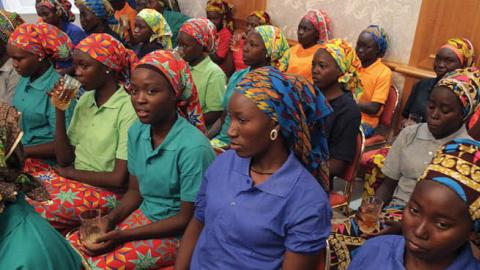Last week in Washington D.C., a young Nigerian woman named Joy Bishara described the horrifying moment in 2014 when she and 275 other Chibok schoolgirls were kidnapped by Boko Haram.
Speaking at a large conference on international religious freedom hosted by Sam Brownback—former U.S. ambassador at large for international religious freedom—Joy recounted that she and her classmates first heard gunshots outside their dormitory, and then saw dozens of armed intruders appear. The terrified girls were forcibly herded into huge trucks and driven on rough backroads into the darkness. During the journey, Joy tried to focus her mind on her options, and eventually summoned the courage to throw herself out of the truck, knowing full well that she was risking her life. She explained, "I decided it would be better if my parents found my corpse than learned that I'd been raped, beaten and enslaved for life."
Another speaker at the conference, Catholic priest Fr. Joseph Fidelis from Maiduguri, Nigeria—the epicenter of Boko Haram and Islamic State violence—portrayed his never-ending responsibilities ministering to traumatized victims. Over many years, hundreds of raped, mutilated and burned victims have managed to survive violent attacks on Christian farms, schools and villages. Their numbers are increasing and their lives are shattered. Fr. Fidelis warns that religious persecution in Nigeria is a "time bomb waiting to explode."
Meanwhile, Boko Haram is not the only bad actor in Nigeria. More than 100 farming communities in Nigeria's southern Kaduna region have been displaced over the last five years in land-grabbing campaigns allegedly perpetrated by radical Fulani herdsmen. During the summit, Religion News Service reported that at least 33 people died with four churches and hundreds of homes burned down in a new attack in Kaduna.
"I am angry. I am worried. Someone is sleeping in their job while thousands of innocent people are being massacred" said Rev. John Joseph Hayab, secretary general of the Christian Association of Nigeria's Kaduna chapter. "What's more worrying is that those who are carrying out the attacks are not being arrested. This is religious persecution. We must call it that. I have 1,000 reasons to believe so."
In January, the Guardian related that worldwide, "more than 340 million Christians—one in eight—face high levels of persecution and discrimination because of their faith." Furthermore, the number of Christians killed for their religion around the world increased by 60 percent in the past year, and more than nine in 10 of them were African Christians.
Nigeria is the wealthiest and most populous country in Africa. It is also the location of the most continuous and escalating Christian persecution, and violence is ripping apart the fabric of the nation. Hardly a week passes without new accounts of mass kidnappings of Nigerian schoolchildren. Christian clergy are abducted and often murdered. Aid workers are gunned down, village churches are torched and churchgoers are massacred.
The Christian Post reported that 1,202 Nigerian Christians were murdered in the first six months of 2020. This is in addition to the more than 11,000 Christians who have been killed since June 2015. The violence has reached such an intensity that expert observers and analysts are warning of a genocide targeting Christians across Africa's largest and most economically powerful nation.
After years of diplomatic efforts on the part of religious freedom advocates, then-Secretary of State Mike Pompeo declared Nigeria a Country of Particular Concern (CPC) on December 7, 2020. Shortly afterward, the U.S. Commission on International Religious Freedom published a statement applauding the decision. "We particularly welcome Nigeria's designation for the first time as a CPC for tolerating egregious violations of religious freedom, which [the commission] had been recommending since 2009," commission chair Gayle Manchin said.
Conversations about Nigeria at the International Religious Freedom Summit focused on the ever-increasing ruthlessness of terror organizations, which are targeting religious centers and groups. Meanwhile, the present spate of kidnappings—largely unaddressed by Nigerian president Muhammadu Buhari's government—led to a shutdown of schools in several states in the wake of previous pandemic school closings, prolonging the denial of quality education to an entire generation. At the same time, there is abundant evidence of the abduction and trafficking of Nigerian girls and women into forced marriages and slavery.
Thus far, President Buhari has either refused—or been too weak—to address the deadly issues metastasizing in his country. He denies some of the evidence and ignores the rest. His increasing authoritarianism is alarming, and his impotence as a national leader is a scandal.
As Bernard-Henri Levy wrote in the Wall Street Journal, "A slow-motion war is under way in Africa's most populous country. It's a massacre of Christians, massive in scale and horrific in brutality. And the world has hardly noticed." Comparing the violence in Nigeria "to Rwanda in the 1990s [and] to Darfur and South Sudan in the 2000s," Levy asked, "Will the West let history repeat itself in Nigeria?"
The violence in Nigeria continues to escalate. The CPC designation was a good first step and must be reissued. However, it is past time for the U.S. government and its international partners to demand relief for Nigeria's innocent, unarmed victims. For unprotected Christians as well as the majority of Muslims who refuse radicalization. For abused and enslaved women and girls. For wounded and traumatized survivors. And for some 3.4 million displaced Nigerians who have been driven from their homes.
Levy concluded his article with a question: "Will we wait, as usual, until the disaster is done before taking notice? Will we stand by as international Islamic extremism opens a new front across this vast land, where the children of Abraham have coexisted for so long?"
We cannot take "yes" for an answer.
Read in Newsweek



















